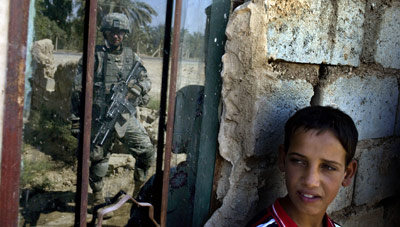
In yesterday’s Real Clear Politics, the Washington Post and anti-Obama pundit Charles Krauthammer showed off his rhetorical disdain for anything resembling accuracy in reporting on the war in Iraq. According to this armchair theory spinner, the war in Iraq has already been won — shades of Henry Kissenger’s disengenuous claim about Vietnam before a previous election. Here is what Krauthammer said:
We know Obama hasn’t been to Iraq in more than two years, but does he not read the papers? Does he not know anything about developments on the ground? Here is the “nothing” that Iraqis have been doing in the last few months:
1. Prime Minister Nouri al-Maliki sent the Iraqi army into Basra. It achieved in a few weeks what the British had failed to do in four years: take the city, drive out the Mahdi Army and seize the ports from Iranian-backed militias.
2. When Mahdi fighters rose up in support of their Basra brethren, the Iraqi army at Maliki’s direction confronted them and prevailed in every town — Najaf, Karbala, Hilla, Kut, Nasiriyah and Diwaniyah — from Basra to Baghdad.
3. Without any American ground forces, the Iraqi army entered and occupied Sadr City, the Mahdi Army stronghold.
4. Maliki flew to Mosul, directing a joint Iraqi-U.S. offensive against the last redoubt of al-Qaeda, which had already been driven out of Anbar, Baghdad and Diyala provinces.
5. The Iraqi parliament enacted a de-Baathification law, a major Democratic benchmark for political reconciliation.
6. Parliament also passed the other reconciliation benchmarks — a pension law, an amnesty law, and a provincial elections and powers law. Oil revenues are being distributed to the provinces through the annual budget.
7. With Maliki having demonstrated that he would fight not just Sunni insurgents (e.g., in Mosul) but Shiite militias (e.g., the Mahdi Army), the Sunni parliamentary bloc began negotiations to join the Shiite-led government. (The final sticking point is a squabble over a sixth Cabinet position.)
The disconnect between what Democrats are saying about Iraq and what is actually happening there has reached grotesque proportions. Democrats won an exhilarating electoral victory in 2006 pledging withdrawal at a time when conditions in Iraq were dire and we were indeed losing the war. Two years later, when everything is changed, they continue to reflexively repeat their “narrative of defeat and retreat” (as Joe Lieberman so memorably called it) as if nothing has changed.
Unfortunately for Krauthammer, his timing could not have been worse. One of the top stories Friday at the Washington Post is this same Iraqi leader’s criticism of the U.S. forces in Iraq. Here is what the paper reported:
BAGHDAD, June 13 — Prime Minister Nouri al-Maliki on Friday denounced demands made by the United States to extend the presence of American troops in Iraq, saying that the two sides are deadlocked and far from reaching an agreement.
“We found out that the demands of the American side are strongly violating the sovereignty of Iraq, something we could never accept,” Maliki said.
In seeking to cushion the war-heavy baggage of John McCain, Krauthammer is the one missing point after point. Point 1: by all accounts Maliki’s ill-considered attempt to take over Basra on his own was a flop and without U.S. backup support he would have been totally humiliated. As Juan Cole observed in Salon, “The campaign was a predictable fiasco, another in a long line of strategic failures for the sickly and divided Iraqi government, which survives largely because it is propped up by the United States.” Point 2: if al-Maliki was so successful in taking town after town on his own, then Obama is right to press for withdrawal of U.S. forces as soon as possible. As for point 3: take away U.S. air support and missile launches and how far does he think the Mahdi Army will fall back? To assume that the current lull in Basra fighting is due to the strength of the central government is a dangerous gambit for a pundit. What looks good one day quickly turns sour on another, as the history of the U.S. occupation proves for all involved. Even General Petraeus, as quoted in Friday’s Economist, cautions that the situation created by the surge is “fragile and reversible.” Indeed, the Saturday update to the Washington Post article notes that the Mahdi Army is being reactivated. And the Economist, hardly a liberal rag, concludes that Al-Qaeda “is certainly not defeated.” The actions of the Iraqi Parliament, which must meet in a virtual prison for its own protection, have been ineffective. Bringing back Ba’athists has been ongoing, given the absurdity of keeping them out of the picture as though they were somehow members of the Nazi Party. But no one thinks this government has its act together or has any standing in the minds of ordinary Iraqis.
Perhaps the most out-of-touch remark is the chimera of enlisting a puppet government in Iraq in the overall fantasy of a global War on Terrorism. Krauthammer claims: “Even the most expansive American objective — establishing a representative government that is an ally against jihadists, both Sunni and Shiite — is within sight.” Within whose sight? Surely not anyone who actually knows the situation in Iraq on the ground. As long as journalists continue to think that Sunni vs. Shi’a sums up the political landscape and politicians need to be reminded that al-Qaeda is not based in Iran, they will continue to miss the point.
My advice to Krauthammer: give your column to a guest on Friday the 13th.
Daniel Martin Varisco